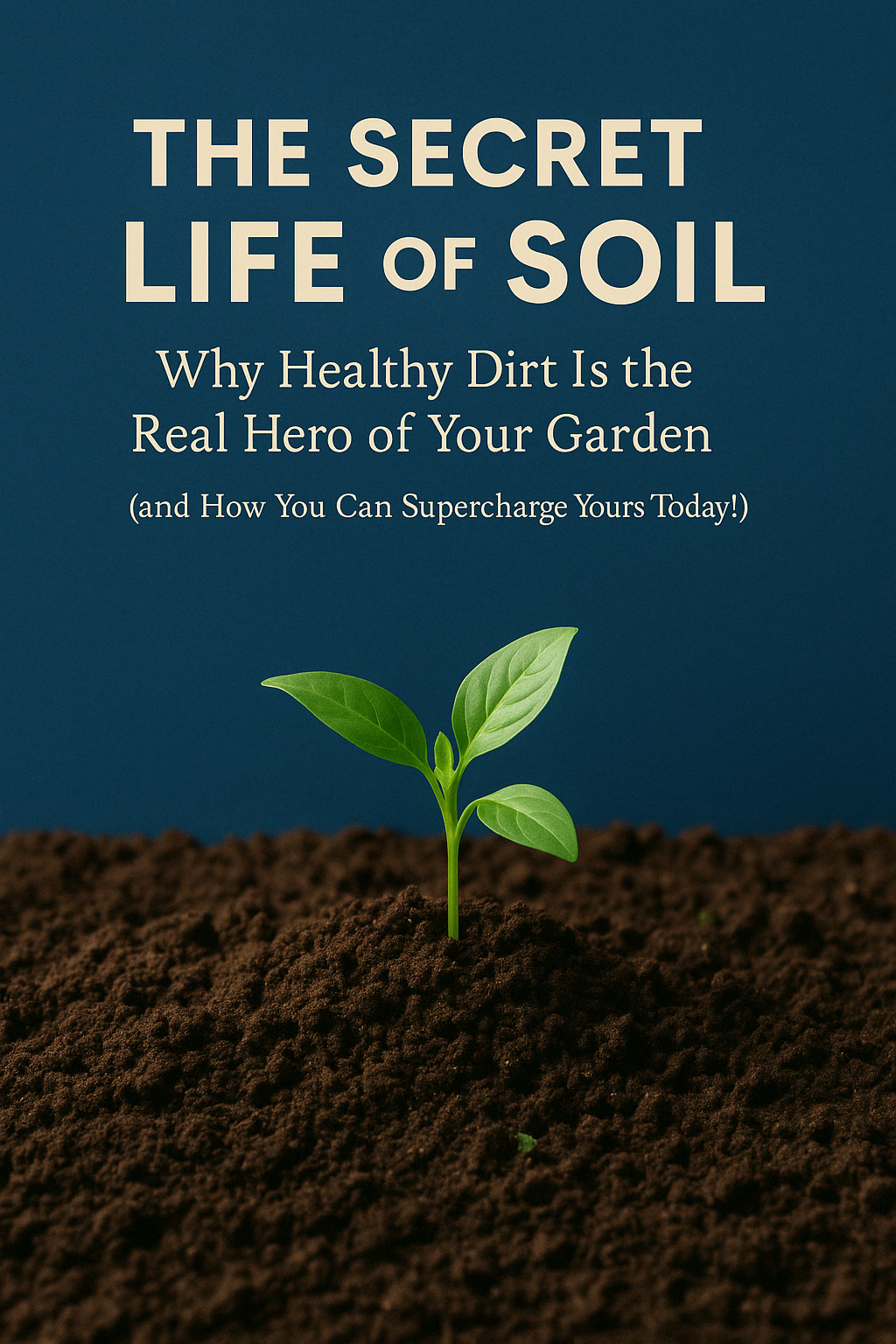
📌 You may think your garden’s success is all about sunlight, seeds, and water—but the true MVP lives underground.
Yes, we’re talking about SOIL. Not just dirt. Living, breathing soil that teems with invisible lifeforms, forming a secret underground network more complex than a rainforest. Soil isn’t just the bed for your plants—it’s a living system that feeds them, protects them, and powers your garden like nature’s original internet.
🌟 Related Read: Before you plant anything, check out our 🌿Epic Guide: How to Prepare Your Vegetable Garden in 2025. It’s packed with expert tips to get your garden off to the best possible start.
So how can we unlock this underground magic and grow the healthiest garden of our lives?

Let’s dig in! 🌱
🌿 Part 1: Soil Is Alive — Literally
Soil is not just a mix of sand, silt, and clay. Healthy soil contains:
-
🦠 Bacteria
-
🍄 Fungi (especially mycorrhizal fungi)
-
🧫 Protozoa
-
🪱 Nematodes and Earthworms
-
🐜 Arthropods
Together, they form the soil microbiome, a living ecosystem that turns organic matter into plant-available nutrients.
🔬 SCIENCE SPOTLIGHT: A single teaspoon of healthy soil can contain over 1 billion microorganisms—more life than the number of humans on Earth!
🧠 Fun Fact: Mycorrhizal fungi form symbiotic relationships with plant roots, expanding their reach and enabling them to absorb more water and minerals. Think of them as the fiber-optic cables of the underground plant network!
🔁 Part 2: Compost, Carbon, and the Circle of Life
Soil thrives on organic matter—and that’s where compost comes in.
-
Compost feeds the microbes 🦠
-
Microbes feed your plants 🌿
-
Plants feed you and regenerate the soil 🌍
This virtuous cycle also builds humus, the sponge-like organic material that holds water and nutrients and resists erosion.
🔥 Composting Tip:
Adding leaf mulch or compost annually can increase microbial biomass by up to 300%. That’s garden rocket fuel!
🪵 Add carbon-rich materials (browns like dry leaves) with nitrogen-rich matter (greens like veggie scraps) for a balanced compost pile.
⚠️ Part 3: The Enemies of Soil Health
Sadly, many modern gardening practices unknowingly destroy soil ecosystems.
🚫 Over-tilling = broken fungal networks
🚫 Pesticides = dead microbes
🚫 Synthetic fertilizers = nutrient cycle disruption
These disrupt soil structure and biodiversity, much like antibiotics destroy gut flora.
✅ What to do instead:
-
Embrace no-dig gardening
-
Brew and apply compost tea
-
Grow cover crops like clover and vetch
-
Use natural fertilizers like worm castings or bokashi
🌍 Let life build below so your plants can thrive above.
🌱 Pro Tip: Avoid these common pitfalls with our must-read article 🌿10 Shocking Gardening Mistakes That Are Killing Your Plants (And How to Fix Them).
🧪 Part 4: How to Know if Your Soil Is Healthy
Here are some DIY soil tests you can do today:
✅ Worm Count
Dig a 12”x12” square. Find more than 10 worms? That’s a sign of thriving soil!
✅ Soil Smell
Good soil smells earthy. Sour, ammonia-like odors signal poor aeration or anaerobic bacteria.
✅ Crumb Test
Squeeze a handful—does it form a crumbly, sponge-like structure? That’s the good stuff.
📊 Want precision? Send a sample to a lab to test for pH, organic matter %, and N-P-K levels.
💥 Part 5: Supercharge Your Garden with Living Soil Techniques
Here’s a quick cheat sheet of proven techniques to build soil wealth:
| 🌱 Technique | ⚡️ Why It Works |
|---|---|
| Composting | Feeds the soil food web, boosts fertility |
| Mulching | Protects topsoil, retains moisture, prevents weeds |
| Cover Crops | Nitrogen fixation, erosion prevention |
| Mycorrhizal Inoculants | Enhances root systems and uptake |
| Bokashi Fermentation | Pre-digests organic matter rapidly |
| Worm Castings | Provides enzymes, microbes, and nutrients |
🔬 Use EM (Effective Microorganisms) or biochar for bonus benefits like toxin adsorption and pH balancing.
🌎 Part 6: Why Healthy Soil Helps the Planet
Healthy soil is a climate warrior.
🌱 It stores 3x more carbon than the atmosphere.
💧 It filters water and prevents runoff.
🐝 It provides homes for pollinators and insects.
🌾 It supports biodiversity from microbes to birds.
Every time you compost, mulch, or skip synthetic chemicals, you’re doing climate-positive gardening.
🧑🌾 Part 7: Beginner Gardeners — Start Here!
Just getting started? No problem!
Here’s your simple starter guide:
✅ Add 2–3 inches of compost in spring and fall
✅ Cover bare soil with straw or wood chip mulch
✅ No tilling—just layer and plant (aka “lasagna gardening”)
✅ Use worm castings or compost tea monthly
✅ Try bokashi bins for kitchen scraps
✅ Optional: Mix in biochar for long-term soil life
💬 Tip: Healthy soil makes gardening easier—fewer pests, less watering, and more bounty.
✅ CONCLUSION
“You don’t grow plants. You grow soil—and soil grows your plants.”
By treating your soil as a living, breathing ally, you’ll unlock deeper roots, bigger harvests, and a garden that’s more alive than ever.
Plus, you’re restoring the planet one compost heap at a time.
Ready to dig deep?
Let’s grow better, together. 🌿🌎
